Literacy development and reading-for-enjoyment is one the most effective ways to put children on the path to educational success. This is why FUNda Leaders across the country, with the help of Nal'ibali, are bringing the power of stories into their communities!
This Mandela Day, we've put together a list of 67 ways that you can bring literacy and reading to all the children in your life. You can choose from this easy list to make the biggest difference in your community - not just on 18 July, but every day of the year!
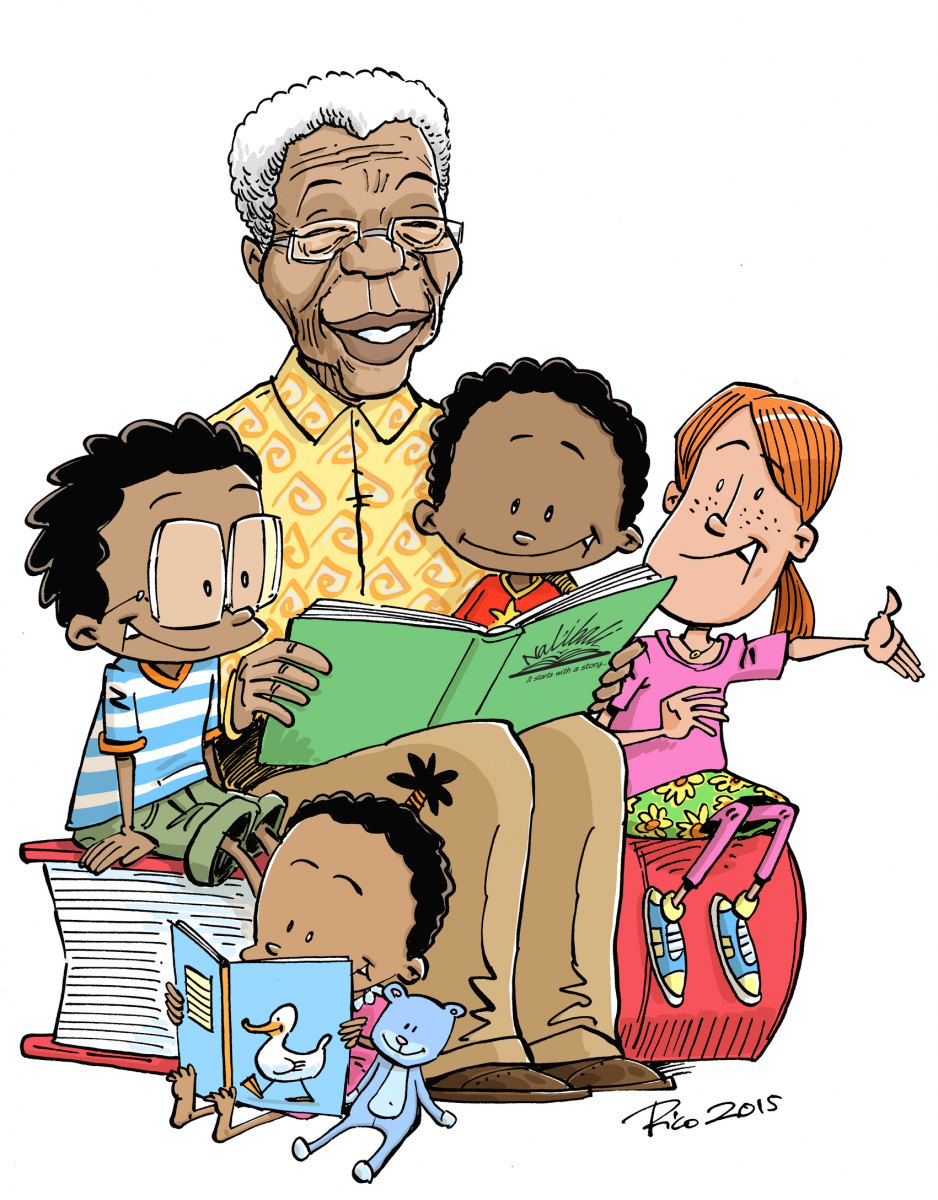
1. Start your own reading club . Whether it’s three or 30 children, get together each week, this month and every month, to grow a love for reading among the children in your life. For tips on how to get your reading club going, visit our How To section.
2. Visit a reading club where you can read to children. Tell them stories, drop off books and stationery – not just during Mandela Month but on a regular basis because all children benefit hugely from many different encounters with stories and books over time. To read more and for suggested clubs in your province, visit the ‘Support Us’ section.
3. Volunteer to read. Or tell stories to children at your local library. For more information about libraries and to enquire about your nearest library, visit www.liasa.org.za or ask at your local municipality.
4. Take a group of children to your local library. Introduce them to the joys of borrowing books. To find a library near you, visit www.liasa.org.za or ask at your local municipality.
5. Build your own memory bank of children’s stories. You don’t have to buy these – you can borrow the from a library. Each month, choose one book to read with children and get to know it really well.
6. Organise a book-drive among your friends to collect or buy books. Make sure to prioritise children’s books in African languages since these are both scarce and much wanted. Scour bookshops, flea markets, thrift stores... For a downloadable tip sheet on choosing books for children in Afrikaans, English, isiXhosa, isiZulu, Sepedi or Sesotho, visit the ‘Resources’ section at www.nalibali.org.
7. Collect cushions, blankets and rugs or carpets and donate them to a reading club near you to create an warm, cosy environment that invites cuddling up to share a good story.
8. Who shares a birthday with Madiba on July 18th? Children can make birthday cards for him or for others on this special day. They could also write letters to Madiba or to other special grown-ups in their lives to mark Nelson Mandela’s birthday.

9. Donate fruit and healthy and non-perishable snacks and drinks to a reading club, in your area. To locate your nearest reading club, visit the Nal’ibali ‘Support Us’ page where you can download a directory of reading clubs in your area.
10. Donate reading related resources to a school, community centre,.Visit our supplies section for tip sheets in English, Afrikaans, isiZulu and isXhosa that are free for you to print and share.
11. Choose 67 stories to tell before Mandela Day. For children’s story ideas in a language of your choice, visit the multiingual story section.
12. Pretend to make a movie. Tell the children that you’re a movie producer and need a story to create a movie about their lives. Watch as they get creative and excited about narrating their experiences!
13. Transform a song and/or rhyme. Ask children which songs or rhymes they know that could be turned into a story. For example: “Miss Polly had a dolly” and “five silly monkeys”. It’s easier if you start with ‘Once upon a time... there was a woman whose name was Miss Polly etc...’.
14. Story mistakes. Make deliberate and silly mistakes when you read or tell a favourite story to young children and let them have fun correcting you. For example, read about Silverlocks and the four bears, and Little Red Riding Socks etc.
15. Become part of the singing the the drama! Choose a story or rhyme with repetition or a chorus, such as “There was an old lady who swallowed a fly”, and “The three little pigs” to share with the children. Once they know it, invite them to join in. Pause and allow them to take over telling the repeated parts.
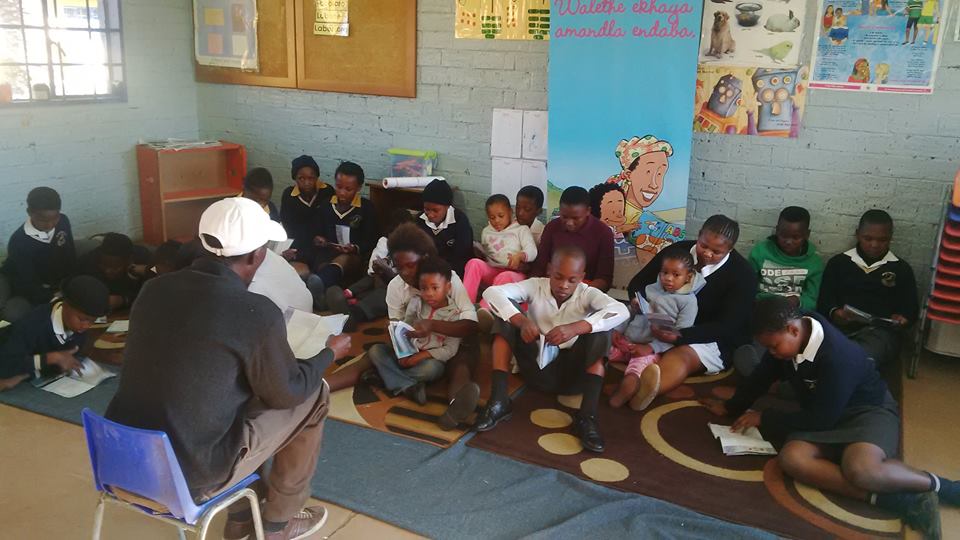
16. Change a story. Change the characters, title, beginning or ending of a story, to make it your own. Young children love it if you use their own names, and those of friends and family members as characters. Ask children for different ways to end a story: sad, silly, happy, unbelievable etc.
17. Tell stories from the story bag. Collect small items to put in a “story bag” (e.g. a ring, a doll, a puppet, a bunch of keys, a wallet, a bell, a sock, or a purse). Children can take turns pulling out items from the bag, and make up stories using these items. Stories can be told either individually, or in pairs.
18. Tell “when I was a baby stories”. Children love it when you share stories about yourself and when you were young. For example, family members can recount their past by beginning a story with, “The day I was born” or “When I was your age...”. Or share stories about your ancestors.
19. Create a story. Make blank books for children to use in different ways. Or invite older children to make a picture book for the younger ones, or for one another. They can get ideas from other storybooks, or they can compose, write and illustrate their own stories. Once finished, invite the children to share their stories with each other.
20. Experiment with words with the children in your life. You, or they, can write each word on a slip of paper, and put it in a box (e.g. happy, egg, train, jumped, giggled). Each child picks a word out of the box, and reads it aloud (or you can do this for them). In small groups, they can make up stories, incorporating the chosen words.
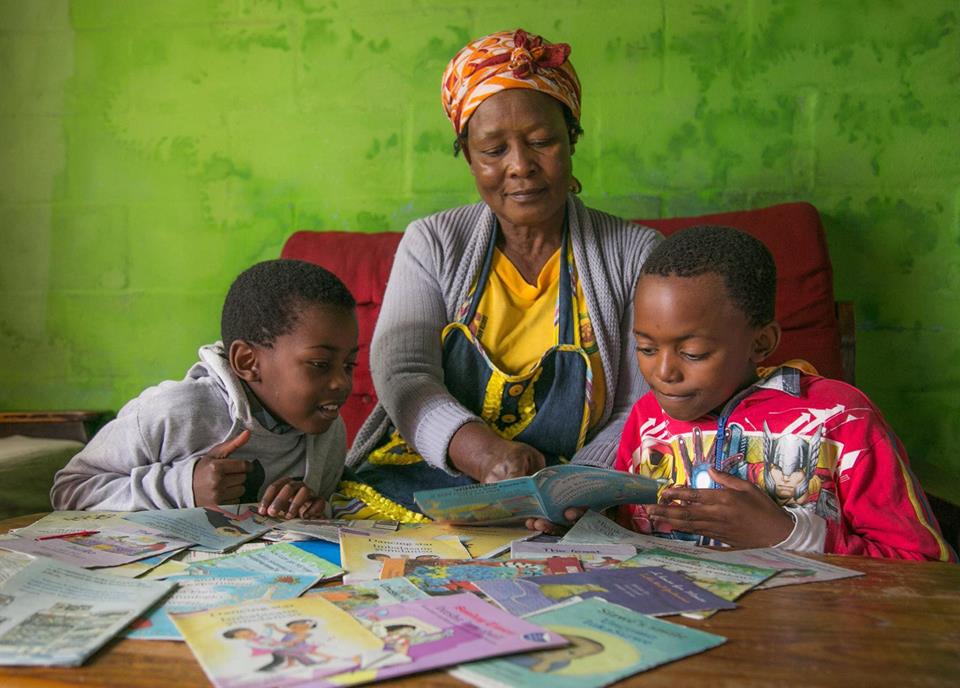
21. Create ‘once upon a time’ blank books and stick them up in your reading club space. Let the children know that if they feel like it, the can add stories as they go.
22. Think, pair, share: after reading or telling a story, ask the children a question such as is there anything about the story that makes you think about your own life? Or: What was your favourite part of the story? Or if it were you in the story, what would you have done? The children sit facing a partner and they share their responses. Each child then takes a turn telling the larger group his or her partner’s response.
23. Tell ‘stewies’. Whether it’s with your own children or children in your reading club, combine one sentence from each of their writtern stories and try to create a whole new story together – a stew of ideas!
24. Act a story. Ask your little ones to tell or write you a story, then become a character in their story and help them act it out. This is a very interactive way to get children happy and creative!
25. Help recruit volunteers. If you have friends, relatives or people in the community who would like to join the FUNda Leader revolution, help them sign up and put them in contact with Nal’ibali. The bigger the network, the more change we can make together!
26. Show and tell. Share your FUNda Leader experiences with people in your community. Show them your pictures and share your resources. This could inspire more people to become more involved in books and reading with their own children.

27. Share your experiences with Nal’ibali. Share photos and opinions with Nal’ibali on our Facebook page. The more we know how your experience is going, the more we’ll be able to support you.
28. Read for enjoyment. Remember that you're a reading role model for children. The more children see you read and enjoy reading, the more they'll copy your behaviour.
29. Start a parent-and-tots group. Babies and toddlers love rhymes, songs, books and stories. Get together with others who are caring for tiny tots and sing songs, say rhymes and enjoy looking at books together. You can find information on sharing books and stories with young children on our web- and mobisites: You can also find rhymes for children in all South African languages here.
30. Share stories in a clinic. Often, adults and children wait a long time for their appointments. Why not bring storybooks that they can read while they wait? You can also read a story to the children. With the adults, you can discuss the importance and power of reading and sharing stories with children in their home language. The tip sheets in the ‘Story supplies’ section of our website will help you.
31. Lead a story flashmob! Use the element of surprise! Find a place in the community where there are many parents and children. Gather some friends and surprise the passers-by with a pop-up storytelling or reading. You can include some performance, and afterwards engage your audience with tips on reading and sharing stories at home.
Let us know about your flashmob via phone or email at least three weeks in advance and we will make every effort to send you promotional materials you can hand out to passers-by!

32. Read to children regularly. Show children the joy of books and stories by reading to them whenever and wherever you can. Encourage friends, family, colleagues and others to do the same.
You can find free stories in the language of your choice in the ‘Multilingual stories’ section. You can also find printable story cards in your language here.
33. Review and promote special stories. Other FUNda Leaders may welcome suggestions about appropriate stories that cover specific themes, such as bullying, abuse, love and kindness, or stories that may work particularly well for certain ages. If you send us a review to info@nalibali.org, we’ll feature your suggestions in the ‘Recommended reads’ section of our website.
34. Fill hungry tummies. Many reading clubs supply the children with a healthy snack, because it’s hard to concentrate if you are hungry! Think about donating food like fruit. Contact our call centre or email us to be connected to your nearest reading club.
35. DIY. You can do small things to make a reading club’s venue comfortable and inviting. Make cushions for the children to sit on, provide blankets, help to put up bookshelves or paint the walls.
36. Help to provide equipment. Many clubs offer drawing and writing activities, so they need equipment like paper, exercise books, pens, pencils, sharpeners, erasers, chalk, crayons, koki pens, scissors, glue and glitter. Collect recycled paper, go through your stationery drawer for things you don’t need, or buy some items and drop them off at a club. Dressing-up clothes and other ‘story props’ are wanted by some reading clubs that support children, especially but not only young children, to explore stories through play and drama.
37. Help with transport. If you own a car, consider helping to take volunteers and children to and/or from the reading club, where necessary, or on outings. And make yourself available to assist the reading club in case of emergency, such as taking someone to a nearby hospital or clinic. These small acts of kindness make a world of difference!
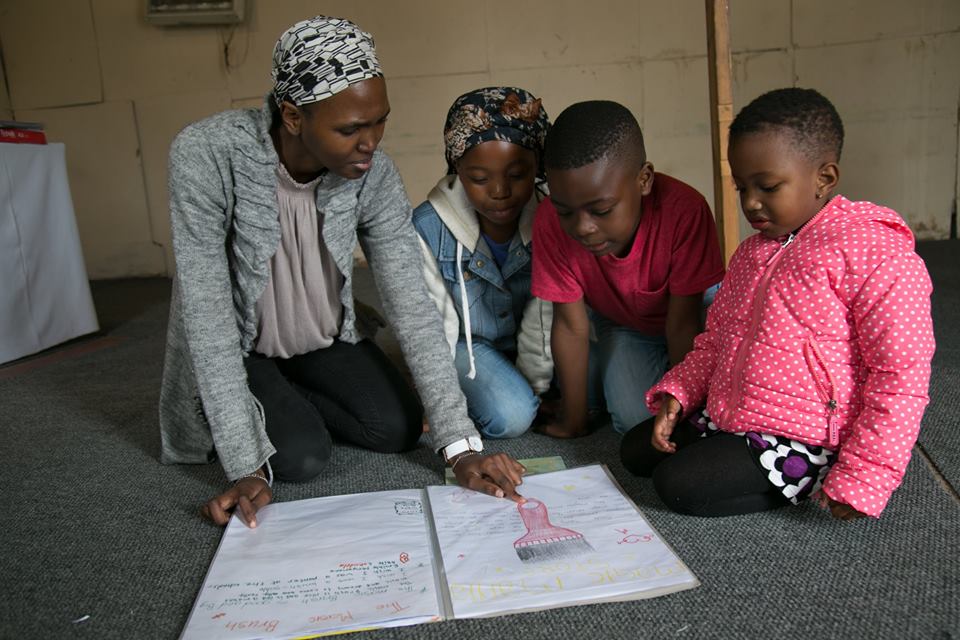
38. Donate books and other reading material. Reading clubs, school libraries and classrooms needlots of books in African languages and in English, as well as other reading material like newspapers and magazines. How about donating a book to a reading club once a month or on your children’s birthdays? Or buy/collect extra copies of the newspaper with the Nal’ibali Supplement in it to donate to a club.
You can also find out what kind of books the reading club you want to support already has and wants, and which language/s would be most useful. Donating a few books at a time is fine – especially if the books are recommended.
39. Help to organise books. You can help a club, a school library or a particular classroom to list and catalogue books, and to create systems for displaying books attractively and for lending them out.
40. Donate money. Money donated to a club, library or school can be used to buy books and equipment, as well as to pay for outings. Every little bit helps!
41. Celebrate literacy days and spread the love. Each year, various literacy days are celebrated all over the world. Why not keep a note of these days in your diary and plan special events around them? Often, Nal’ibali will plan events that you can take part in. As a signed up FUNda Leader, you’ll hear from us about how you can be involved. For example, you can help to arrange events at schools, libraries, community centres, etc, where more people can learn about the importance of reading, writing and storytelling.
42. Become a literacy ambassador. You have a network of friends, community members, people on social media, colleagues, people at your children’s school and so on. Talk to them about the role of reading aloud, mother tongue stories and reading for enjoyment. You have the power to grow the FUNda Leader network, and start a reading revolution in your own circle!
43. Inspire others. Whether it’s by giving them books, inviting them to your club, helping them find resources, or setting up meet-and-greets, it’s easy to inspire others by sharing what you do. By making the FUNda Leader circle bigger, you’ll set the ball rolling for YEARS after Mandela Day.
44. Become active at schools. Start a reading club at your child’s school, or a school in your cmmunity. If you need help contacting the school, simply ask Nal’ibali for assistance on Facebook and we’ll help you get going!
45. Make cut-out-and-keep books. You can download and print the Nal’ibai supplements online here. Simply cut out and create the books to share with your children, reaidng clubs or schools in your community!
46. Read with your child every night. This is simple, easy and takes only 15 minutes. It’s also an activity that you can do every single day – we hope Mandela Day kickstarts these beautiful bonding moments between you and the children around you.
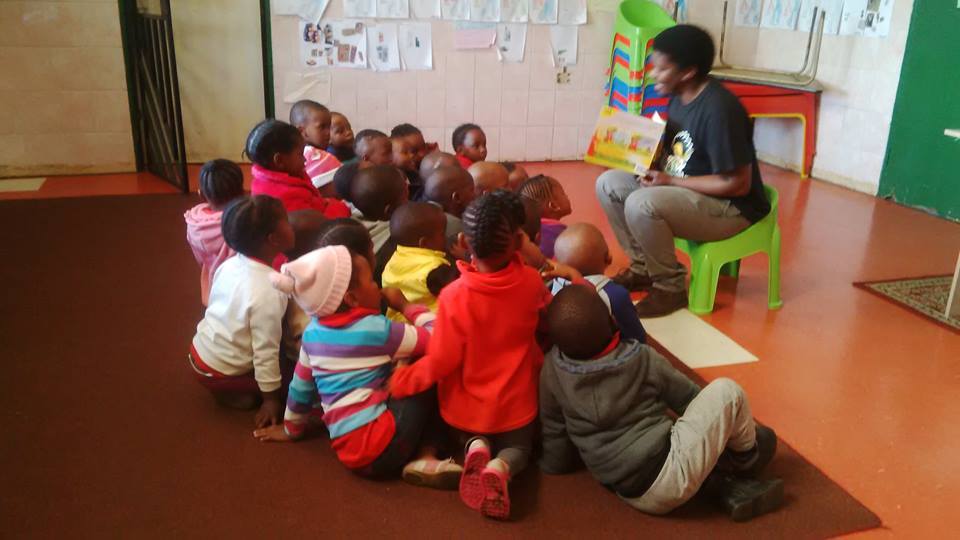
47. Teach others how to access free stories in their language. Having access to stories in a language you’re comfortable in is crucial in literacy development. Nal’ibali offers FREE multilingual stories. Once you’ve accessed them HERE, help others do the same!
48. Hold meet-and-greets with other parents. Invite parents of your children’s friends for a meet and greet to chat about the literacy activities you’re doing. Building these relationships means that you can support each other and start reading clubs together!
49. Ask your children or reading group what they want to be when they grow up. It’s a simple question, but doing this regularly helps your child explore ideas with you. It always makes them feel heard and listened to as they narrate why they would like to be whatever they choose!
50. Organise a group poem reading. If the children in your life, or your reading club children, write stories and poems – pick a day to read them. This helps them feel affirmed in the words they’ve shared!
51. Share favourite quotes. Share your favourite quotes from books with your children and discuss them. Talking about books and phrases help children put meaning to words.
52. Create a glossary of words for the children. If you pick up that the children don’t know the meaning of certain words, create a little glossary and stick it up in the space.

53. Recycle. Don’t’ throw away newspapers or old books or magazines. Simply donate them to a reading club near you. To find out which reading clubs are close to you, email info@nalibali.org
54. Record your own audio stories. Storytelling is an easy way to get children involved in books and reading. Once you’re comfortable enough, record your stories so that you can share them with others in your reading club.
55. Set the scene. Make your reading club a fun space by putting up pictures, props and words. You don’t need anything fancy, just magazines and some glue! Or, help another reading club make their space
56. Help older children create plays. Acting out stories is a great way for children to interact with books. Sit down with some of the older children in your reading club and help them write plays to act out for the young ones!
57. Donate a story basket. If you don’t have a reading club of your own, donate a ‘basket’ of story supplies, such as crayons, books, magazines, Nal’ibali supplements, etc.
58. Reach out to Nal’ibali for training. If you’re a FUNda Leader and want to be trained by Nal’ibali, email us at info@nalibali.org. We’re here to help you bring literacy to your home and community in whatever way we can – not just for Mandela Day, but throughout the year!
59. Invite a storyteller to your reading club or school. If you love telling stories, or know a good storyteller, treat the children in your reading club or school by treating them to a fun storytelling session!
60. Start a conversation. Whether you’re on whatsapp or Facebook, start a conversation about reading and literacy with your friends. Throw out some ideas and get a discussion going!
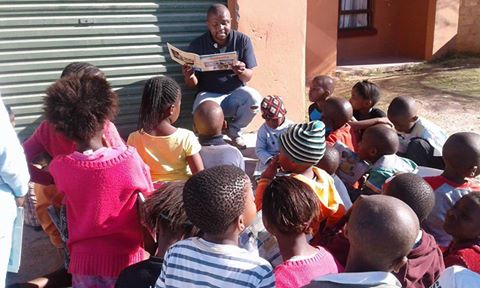
61. Create a story book wall. Create a beautiful story book wall in your home for the children in your life. Stick inspirational pictures, their favourite characters and moments that you’ve shared together. This wall can be a visual of your ‘story’ and experiences that you can narrate with your children, or reading club.
62. Collect and complie African language stories. Whether it’s folk tales, songs, lullabies, tongue twisters or riddles, use them to create posters or booklets for children. The more children see themselves and their language in tales, the betetr!
63. Read to your children’s friends. If you don’t have a reading club, make some time to sit with your children and their friends to share a story after play time. This doesn’t only have to be for Mandela Day, but for the whole year.
64. Bring food to an existing reading club. Reading clubs are run by hard working FUNda Leaders, and parents and children who are committed enough to arrive every day. So whether it’s fruit, sandwiches, or juice, donating these to a club will make a big difference.
65. Donate old books to a pregnant woman. Literacy development occurs before a baby is even born, as parents start creating the environment that the child will be born into. So donate books and resources to expecting mothers to help them create a story-rich environment for their newborn.
66. Inspire children to write stories based on a chosen sentence or word. Visit out Story Seeds section to find great starting points for stories. Share these with your children or reading club to inspire them to expand their imagination.
67. Take children to an animal shelter to read-aloud. Children who are shy to read aloud are often worried that they’re being judged. If you have pets, get your children to read aloud to the animals. If not, take the children to an animal shelter. Reading to cats and dogs allow kids to feel more confident and safe – and is a great experience for the animals too!
Download the kick off kit as a printable right here.
